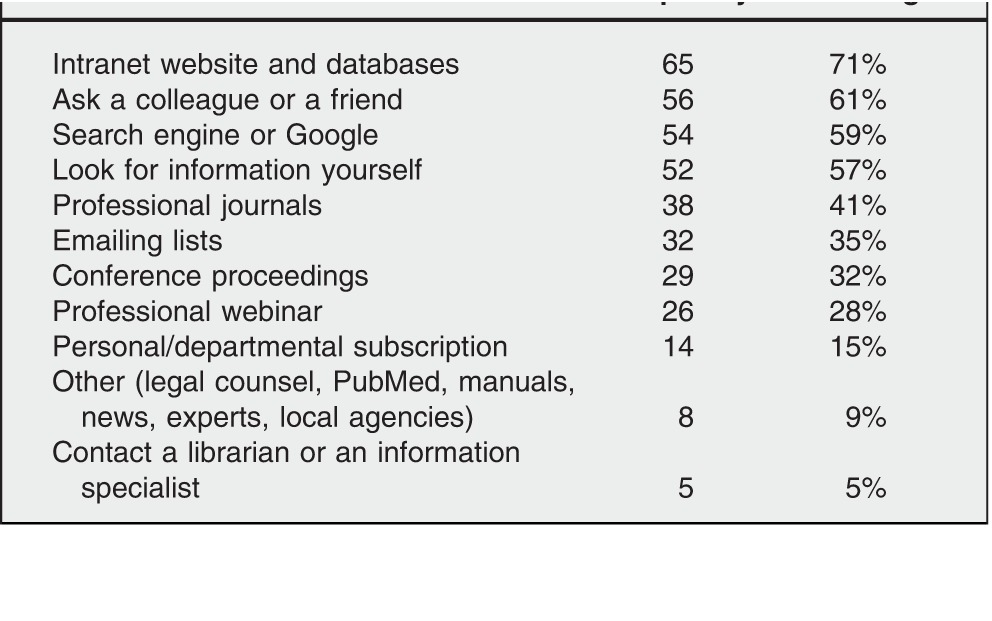Abstract
Objectives
This study assessed the need to develop a public health informatics (PHI) introductory course and determine contents of such a course.
Methods
Community assessments employing focus group interviews and an online survey were utilized to determine course need and content.
Results
Results revealed a need to provide PHI training to graduate public health students and suggested broad course content requirements. Results indicated lack of awareness of libraries and librarians as sources of public health information.
Conclusions
A graduate PHI course was developed and delivered. Additionally, implementation of a subject guide increased the library's profile.
Keywords: Public Health Informatics; Needs Assessment; Education, Public Health Professional; Community-Institutional Relations
INTRODUCTION
The importance of public health informatics (PHI) cannot be understated. Public health professionals apply a population-based approach to a range of health care issues and rely on data, policies, and technology to respond to health crises and emergencies [1]. The ability to access “credible and relevant information” is considered essential to the public health workforce's job planning and decision making [2]. Highlighting the importance of PHI, the Centers for Disease Control and Prevention (CDC) states that “a possession of informatics competencies…even for a basic understanding of public health informatics is beneficial” [3].
In Mississippi, where 56% of residents are located in rural areas and 79 out of 82 counties are classified as primary care service shortage areas [4, 5], public health professionals play a key role in maintaining the health status of the population. Nevertheless, the current health care system may not be prepared for the information age [6] at a time when continued effectiveness of the public health workforce is increasingly tied to the accurate and timely use of data, information, and technology from varied sources [7].
The main objectives for this study were verifying the need for a PHI course and determining course content through identification of knowledge gaps between learning and practice. This study follows the framework of collaboration between librarians and members of the public health workforce [8] with an attempt to establish a PHI introductory course targeting graduate-level library science and public health students—the future public health workforce.
METHODS
This study was a collaboration between the School of Library and Information Science (SLIS) and the Department of Public Health (DPH) at the University of Southern Mississippi (USM). Employing community assessment, the team collected data with consent through: (1) holding focus groups to explore the need to offer a PHI introductory course and (2) administering a survey to determine PHI needs in actual practice.
Modeling a prior PHI training [9], the team used focus groups and recruited participants through email lists, a flyer, and class announcements. Focus group questions were designed to explore participants' understanding of PHI, informatics use in classes, and content expectations for a potential PHI course.
A single month-long online survey using the Qualtrics® software was administered to members of two professional health associations: the Mississippi Rural Health Association (MRHA) and the Mississippi Public Health Association (MPHA). The instrument leveraged the knowledge of prior informatics competency surveys [10, 11] and collected information mainly in three areas: professional profile, usage of key public health information resources, and utilization of data, information, and technology. The leaderships of the two associations encouraged the effort by notifying their membership of this survey.
All focus group sessions were audio recorded and transcribed. Using standard qualitative research procedure [12], the team then organized all data into conceptual themes. Both the survey process and the descriptive statistical analyses of the responses were performed using Qualtrics.
RESULTS
Focus groups
Ultimately, seven DPH faculty members who specialized in biostatistics, epidemiology, health policy and administration, and health education attended one focus group session, while eight students participated over two sessions. The study had three focus group themes: the perception of PHI, the need for a course, and the potential content of the course. Analysis showed that faculty members did not share a common understanding of PHI, while master's of public health (MPH) students had little awareness of it. Additionally, faculty members were concerned about students' lack of informatics skills and emphasized the need to familiarize students with databases, health data, and technology. When probed, the students concurred that they had limited PHI knowledge. The results indicated that students needed informatics preparation for their graduate studies.
Survey results
As for the survey of public health professionals, 101 respondents initiated the survey, about 15.5% of a membership pool of 650. The professional profiles showed a wide distribution of public health professions including physicians, nurses, nurse practitioners, dieticians, health educators, epidemiologists, biostatisticians, environmentalists, social workers, administrators, researchers, policy analysts, and others. In terms of job locations, the largest group worked at the state level (n=40/95, 42%), while others were distributed across regional, county, local, and even national and international levels. Additionally, the vast majority of the respondents had more than 5 years of public health work experience (n=74/94, 79%).
Probing where professionals located information indicated that most used intranet websites, databases, asking a colleague, or search engines. Many also indicated journals, conference proceedings, and webinars. However, only 5% of the respondents indicated librarians as a source of public health information (Table 1). Additionally, although most respondents seemed familiar with national and state-level health agency websites such as that of the CDC, only a few, (n=8, 9%), were aware of the resources available at the library.
Table 1.
Respondents' means of locating work-related information (n=92)

In terms of what types of information and tools they used, the professionals noted that they used a diverse set of tools including, but not limited to, CDC Wonder, geographic information system (GIS), statistical, surveillance, economic, and data visualization tools to collect and disseminate health statistics, health status indicators, consumer health information, medical research, drug information, federal or state legislation, funding sources, policy, regulatory updates, and other information. The professionals also believed that utilizing modern information technology is important in promoting public health.
DISCUSSION
Based on the results of the study and adoption of the framework of collaboration between librarians and the public health workforce [8], the SILS at USM has developed and offered a PHI course to both graduate public health and library science students. The course presents diverse content based on working professionals' information needs and includes modules that feature an overview of health informatics, data, health information technology, e-health, evidence-based practice, health information resources, personalized medicine and genomics, consumer health informatics, and informatics careers. To further enhance the profile of libraries and librarians as public health resources, a PHI subject guide incorporating Mississippi health characteristics has also been incorporated into USM's library website and serves as a supplementary course resource. Additionally, the guide has been registered with the Medical Library Association's Educational Clearinghouse.
ACKNOWLEDGMENTS
This project has been funded in whole or in part with federal funds from the Department of Health and Human Services, National Institutes of Health, National Library of Medicine, under contract no. HHS-N-276-2011-00004-C with the University of Maryland Baltimore.
The authors thank the School of Library and Information Science and the Department of Public Health at the University of Southern Mississippi for their support of the project. The authors are indebted to Charles Daughdrill and Ryan Kelly for their assistance in the survey of the Mississippi Public Health Association and the Mississippi Rural Health Association members.
Biography
Xinyu Yu, PhD, MLIS, xinyu.yu@usm.edu, Associate Professor, School of Library and Information Science, University of Southern Mississippi, Hattiesburg, MS; Yue Xie, PhD, MHA, MEng, yue.xie@shsu.edu, Assistant Professor, Faculty Advisor, Master's in Health Quality and Safety, Department of Health Services and Promotion, Sam Houston State University, Huntsville, TX; Xuequn Pan, PhD, MS, xuequn.pan@nih.gov, Post-Doctoral Fellow, Laboratory for Informatics Development, National Institutes of Health Clinical Center, Bethesda, MD; Susan Mayfield-Johnson, PhD, MPH, susan.johnson@usm.edu, Assistant Professor, Department of Public Health, University of Southern Mississippi, Hattiesburg, MS; Jessica Whipple, MLIS, jessi.gibbons@gmail.com, Hattiesburg, MS; Elena Azadbakht, MSI, elena.azadbakht@usm.edu, Health and Nursing Librarian and Assistant Professor, University Libraries, University of Southern Mississippi, Hattiesburg, MS
Footnotes
Based on the outreach project that has been funded in whole or in part with federal funds from the Department of Health and Human Services, National Institutes of Health, National Library of Medicine, under contract no. HHS-N-276-2011-00004-C with the University of Maryland Baltimore.
REFERENCES
- 1.Cogdill KW. Introduction: public health information outreach. J Med Lib Assoc. 2007 Jul;95(3):290–2. DOI: http://dx.doi.org/10.3163/1536-5050.95.3.290. [Google Scholar]
- 2.Cahn MA, Auston I, Selden CR, Cogdill K, Baker S, Cavanaugh D, Elliott S, Foster AJ, Leep CJ, Perez DJ, Pomietto BR. The partners in information access for the public health workforce: a collaboration to improve and protect the public's health, 1995–2006. J Med Lib Assoc. 2007 Jul;95(3):301–9. doi: 10.3163/1536-5050.95.3.301. DOI: http://dx.doi.org/10.3163/1536-5050.95.3.301. [DOI] [PMC free article] [PubMed] [Google Scholar]
- 3.Centers for Disease Control and Prevention. Competencies for public health informaticians. [Internet] Atlanta, GA: The Centers; 2014 [cited 7 Nov 2014]. < http://www.cdc.gov/informaticscompetencies/>. [Google Scholar]
- 4.Health Resources and Services Administration. List of rural counties and designated eligible census tracts in metropolitan counties: updated census 2010. [Internet] Rockville, MD: The Administration; 2014 [cited 19 Jan 2015]. < ftp://ftp.hrsa.gov/ruralhealth/eligibility2005.pdf>. [Google Scholar]
- 5.US Department of Health and Human Services, Health Resources and Services Administration. Find shortage areas: HPSA by state & county. 2015 [Internet] The Department [cited 14 Jan. < http://hpsafind.hrsa.gov/HPSASearch.aspx>. [Google Scholar]
- 6.Cobus L. Integrating information literacy into the education of public health professionals: roles for librarians and the library. J Med Lib Assoc. 2008 Jan;96(1):28–33. doi: 10.3163/1536-5050.96.1.28. DOI: http://dx.doi.org/10.3163/1536-5050.96.1.28. [DOI] [PMC free article] [PubMed] [Google Scholar]
- 7.Yasnoff WA, O'Carroll PW, Koo D, Linkins RW, Kilbourne EM. Public health informatics: improving and transforming public health in the information age. J Public Health Manag Pract. 2000;6:67–75. doi: 10.1097/00124784-200006060-00010. [DOI] [PubMed] [Google Scholar]
- 8.Banks MA, Cogdill KW, Selden CR, Cahn MA. Complementary competencies: public health and health sciences librarianship. J Med Lib Assoc. 2005 Jul;93(3):338–47. [PMC free article] [PubMed] [Google Scholar]
- 9.Eldredge JD, Carr RD. Public health informatics training in New Mexico. J Med Lib Assoc. 2007 Jul;95(3):343–6. doi: 10.3163/1536-5050.95.3.343. DOI: http://dx.doi.org/10.3163/1536-5050.95.3.343. [DOI] [PMC free article] [PubMed] [Google Scholar]
- 10.Lee P, Giuse NB, Sathe NA. Benchmarking information needs and use in the Tennessee public health community. J Med Lib Assoc. 2003 Jul;91(3):322–36. [PMC free article] [PubMed] [Google Scholar]
- 11.Cunningham DJ, Ascher MT, Viola D, Visintainer PF. Baseline assessment of public health informatics competencies in two Hudson Valley health departments. Public Health Rep [Internet] 2007 May;122(3):302–10. doi: 10.1177/003335490712200303. [cited 1 Feb 2015]. http://www.ncbi.nlm.nih.gov/pmc/articles/PMC1847492/ [DOI] [PMC free article] [PubMed] [Google Scholar]
- 12.Miles MB, Huberman AM. Qualitative data analysis. 2nd ed. Thousand Oaks, CA: Sage; 1994. [Google Scholar]


